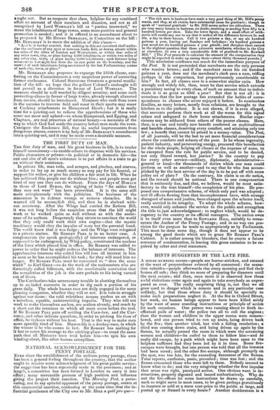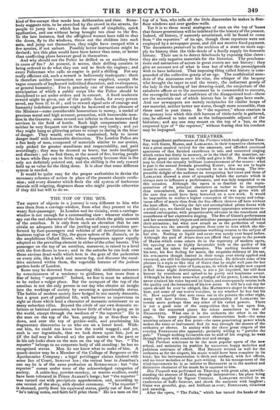HINTS SUGGESTED BY THE LATE FIRE.
A HOUSE-BURNING occurs—people are horror-stricken, and amazed at the want of preparedness evinced by all concerned : the sensa- tion subsides—people afterwards rise every morning and find their homes all safe ; they think no more of preparing for disasters until the next occurs ; and then, once more it is observed how these • awful visitations come again and again to take everybody as unpre- pared as ever. The really surprising thing is, not that we all grow used to danger which is remote and in any particular case unlikely, but that those whose duty it should be specially to make such preparations neglect it. At the fire in Oxford Street, last week, six human beings appear to have been killed solely by the want of some standing instructions or principle of action for such occasions. One person was running about to fetch in- effectual pails of water ; the police ran all to call the engines ; then the women and children in the upper rooms were remem- bered, and one person tried to run up stairs, being driven back by the fire; then another tried, but with a failing resolution ; a third was coining down stairs, and being driven up again by the flames, he actually passed the room in which were the screaming women and children—he called to them to follow him—and he really did escape, by a path which might have been open to the helpless sufferers had they been led by it in time. Some fire- escapes were brought, but one person was told that all the inmates had been saved; and the other fire-escape, although promptly on the spot, was too late, for the exceeding fierceness of the flames. False reports, confusion, panic, prevailed ; time was lost ; and the flames consumed those who were left to them. Nobody seemed to know what to do; and the very misgiving whether the first impulse that arose was right, paralyzed action. One obvious want is in- structions, properly digested and issued authoritatively. Why do not the fire-offices let some instructions be drawn up carefully, such as might serve in most cases, to be given perhaps gratuitously to insurers or sold at a mere cost-price to the public at large, and posted up or framed in every house ? Another desideratum is a kind of fire-escape that needs less deliberation and time. Some- body suggests nets, to be stretched by the crowd in the streets, for people to jump into ; which has the merit of simplicity, quick application, and use without being brought too close to the fire. In the late instance, had the affrighted women been told to shut the doors, fly to the windows, throw out the children into such nets, and jump out themselves, they might have escaped with a few sprains, if not unhurt. Possibly better instructions might be devised; but this plan would have been better than none, or better than conflicting plans however good in themselves. And why should not the Police be drilled as an auxiliary force in eases of fire ? At present, it seems, their drilling consists in being ordered to do what they can and to fetch the engines ; and every Policeman who calls an engine is paid a shilling. For any really efficient aid, such a reward is ludicrously inadequate: there is therefore neither instruction nor motive supplied, except the vague counsels of haphazard individual discretion, and twelvepence, or general humanity: Fire is precisely one of those casualties in anticipation of which a public corps like the Police should be disciplined to act under orders and in concert. A fixed moderate reward might be given, out of the public funds, for every person saved, say from U. to 51.; and to reward signal acts of courage and humanity indefinite guerdons might be bestowed at the pleasure of the Minister—some considerable honorarium in money, a medal of precious metal and high account, promotion, with honourable men- tion in the Gazette; some reward not inferior to those bestowed for services in the field of battle. Such high compensations need neither be very frequent nor in the aggregate very costly ; and yet they might bang as glittering prizes to tempt to daring in the hour of danger. They would, even when unattained, help to invest danger itself with honourable distinction. The London Police are a fine body of men, composed of materials similar to our armies, only picked for greater steadiness and respectability, and paid accordingly ; they may be deemed as brave, but more intelligent and discreet : yet we find them, at the sound of fire, leaving people to burn while they run to fetch engines, merely because that is the only act definitely pointed out, and the shilling is the only reward held up as value for the thing done. It is clear that some different system is needed.
It would be quite easy for the proper authorities to devise the gecessary schemes of action in place of the present chaotic confu- sion; and every disaster which finds the old system of barbarous misrule still reigning, disgraces those who might provide otherwise if they did but will to do so.



























 Previous page
Previous page